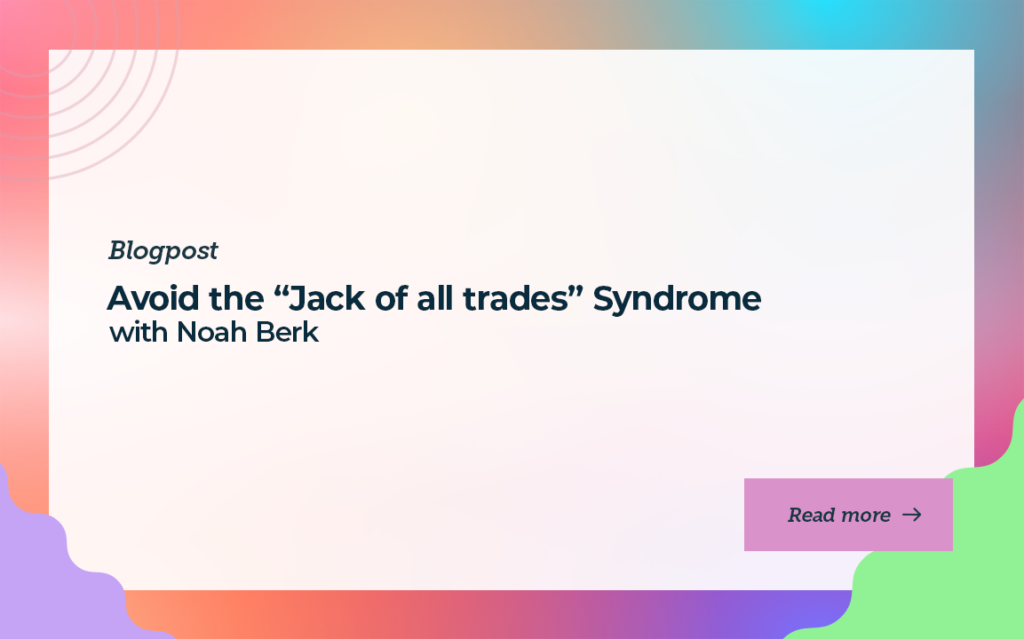Avoid the “Jack of all trades” Syndrome with Noah Berk

“You either crush it and they don’t need you anymore, run out of leads, or just don’t get the results. Every cold email engagement has an expiration date.”
That was the reality for Noah Berk and his co-founder in 2016. Their business, built on cold outbound, worked at first. But behind the early wins was a model that couldn’t hold.
The premise was simple when they launched: Cold email works, and no one’s doing it well.
On day one, their campaigns booked 8 or 9 unheard-of meetings out of 100 emails. It looked like product-market fit. But the clients didn’t stick. Either the pipeline dried up, the targeting exhausted itself, or the results didn’t come fast enough. Regardless of success, the outcome was the same: churn.
What followed wasn’t just a pivot but a lesson in building a real, sustainable services business.
Cold Email Was a Door, Not a Business
The problem wasn’t cold email itself. It was the nature of the engagements. They were transactional by design. The team was constantly judged on short-term results, with no infrastructure to build deeper value.
“It wasn’t something that really excited us,” Noah says. “We were good at it, but it didn’t stick. Clients treated it like a quick fix.”
The team realized what they needed to build wasn’t campaigns, it was systems. Clients asked for help with newsletters, marketing automation, and backend operations. So they moved upstream.
Clients Were Pulling. They Decided to Listen
That early pull to set up marketing automation, implement CRM, and connect tools like Mautic was a real opportunity. It wasn’t glamorous. It wasn’t high-volume. But it was sticky. And stickiness compounds.
From there, the team discovered HubSpot. What started as an open-source experiment quickly shifted into a deeper platform play. They became HubSpot partners, moved toward CRM and RevOps, and evolved into long-term infrastructure partners rather than short-term campaign providers.
Tactics Expire. Infrastructure Sticks.
The shift wasn’t about cold email vs inbound. It was about control vs dependency. As a cold outbound shop, they were constantly at the mercy of lists, response rates, and spam filters. Once they moved into systems, they owned the backend and the client relationship with it.
“It wasn’t about being judged on results anymore,” Noah explains. “It was about being embedded in how their revenue systems worked.”
That allowed the company to eventually merge into Aptitude 8 and become a HubSpot Elite Partner with long-term client engagements.
You Don’t Start with Product-Market Fit. You Carve It Out
Early on, the work came from everywhere, cold calling, referrals, outbound, even a sister marketing agency passing along the occasional lead.
Noah’s team at OBO was doing PPC, SEO, Salesforce, HubSpot, and Monday.com all at once. It wasn’t pretty, and it definitely wasn’t focused.
But it kept the lights on.
“We were good at a bunch of things. But we had to get real about which one we could be the best at.”
You Chase Revenue Until You Can Choose Revenue
Most founders don’t start with a neat strategy. They start by taking whatever work they can get. That’s not a failure, it’s a phase.
In OBO’s case, that meant juggling agency work while slowly being pulled into more technical consulting: CRM setups, HubSpot implementations, Salesforce migrations. The signal wasn’t immediate, but it was clear:
- Clients kept asking for deeper tech help
- HubSpot kept growing its Sales Hub
- And HubSpot’s own reps started referring deals their way
That was the turning point, moving from chasing revenue to being positioned to earn it.
Specialization Starts as a Bet
By 2019, they made the call: drop the marketing work, and go all-in on technology. Then another: spin out the Monday.com practice into its own company. And finally: drop Salesforce, and focus solely on HubSpot.
This wasn’t just a preference. It was strategic positioning. As HubSpot moved upmarket, more complexity meant more services. And OBO, being early to the ecosystem, had the edge.
They weren’t just another partner. They became HubSpot’s first Advanced Implementation Certified partner in the world. That credibility created a flywheel of inbound referrals, partner deals, and larger projects.
Real PMF Feels Like Momentum
Noah points to the end of 2023 as the inflection point. The signs were clear:
- Project sizes were growing.
- Clients were signing longer-term contracts.
- The team had a shared language: HubSpot.
Everything, from sales and marketing to internal training, aligned around one mission: Be the best HubSpot partner in the world. They stopped hedging. They started scaling. Today, Aptitude 8 is HubSpot’s #2 solutions partner globally.
The Playbook in Reverse
You don’t find product-market fit in a moment of clarity. You back into it by shedding everything that doesn’t fit.
For Noah and his team, it was: First cold email. Then, marketing services. Then Salesforce. Then Monday. What’s left is the core. And that’s where scaling begins.
Most Partnerships Don’t Work. This One Did.
HubSpot has over 7,000 solution partners. Most never rise above the noise. But Aptitude 8 did, building one of the ecosystem’s top-ranked services businesses.
The difference wasn’t luck, network, or timing. It was a deliberate strategy to treat HubSpot like a customer, not just a channel.
Partner Strategy ≠ Partnership Wishful Thinking
Most service companies approach partnerships with a vague goal: “Let’s co-market and see what happens.”
Aptitude 8 built a go-to-market engine around their partner from day one:
- Embedded technical experts early in HubSpot’s sales process.
- Structured their team to align with how HubSpot sells.
- Focused on helping HubSpot reps win bigger deals, not just any deal.
That made them reliable. That made them valuable. And it gave HubSpot a reason to keep sending work their way.
Only Partner Where the Money Makes Sense
The model worked because HubSpot wasn’t just a product. It was a platform with a depth of services.
Noah and team learned to ignore low-leverage partnership pitches from lightweight apps with no pipeline, differentiation, or professional services opportunity.
They focused on:
- Platforms with real implementation complexity.
- Clear pathways to recurring services revenue.
- Partner teams that invest in co-selling.
That’s why HubSpot worked, and why many others didn’t.
The Path to #2: Specialize, Systemize, Scale
As the business matured, the team shed distractions:
- Salesforce: dropped.
- Monday.com: spun out.
- HubSpot: doubled down.
That focus helped them scale. Then they merged with one of their top competitors, OBO, to build what’s now Aptitude 8, the second-largest HubSpot consultancy in the world.
Their strategy from here is simple:
- Stay ahead of HubSpot’s enterprise push.
- Embed AI into delivery and operations.
- Build the strongest technical culture in the ecosystem.
Conclusion
Aptitude 8 didn’t scale by getting everything right. They scaled by getting serious about what was working and cutting everything else.
The lesson isn’t about HubSpot or even partnerships. It’s about leverage.
They moved from tactics to infrastructure. From chasing revenue to earning it. From generalists to the go-to partner. And every step of the way, they narrowed the focus. That’s what creates momentum. That’s what scales.
If you want a product-market fit that compounds and builds around the work clients can’t walk away from.
Need help making HubSpot actually work for your business? Noah Berk and the team at Aptitude 8 are the go-to technical consultancy in the ecosystem.
Want more unfiltered founder stories like this? Subscribe to the Predictable Revenue YouTube Channel for weekly podcast episodes hosted by Collin Stewart.
NO TIME TO READ?


